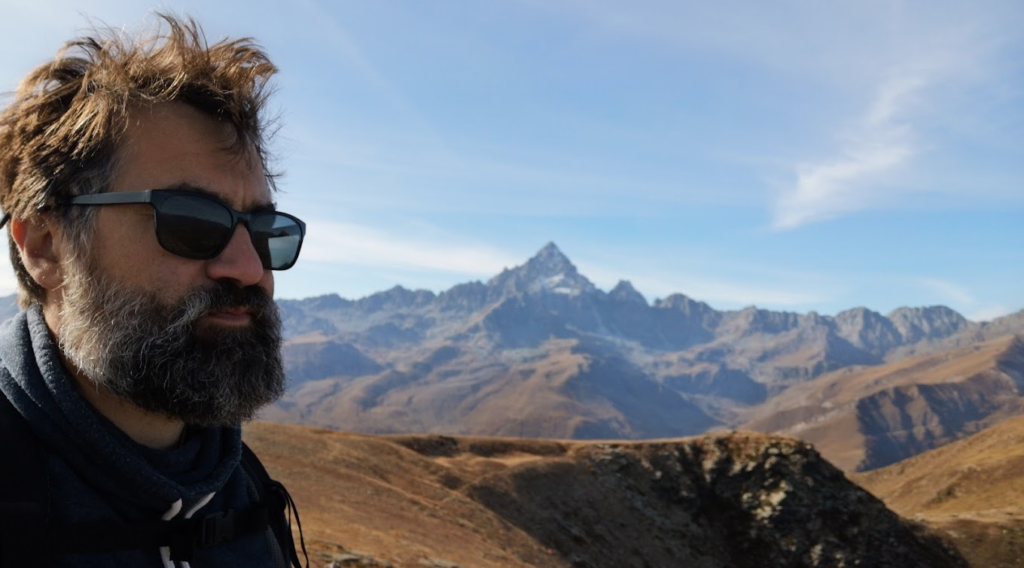
Scientific biography
(CV – Biographic sketch – Business card).
I was born in 1977 in Turin, Italy. From 1996 to 2002 I studied Medical Biotechnology at the University of Turin, working full time in the laboratory as an undergraduate intern. My initial research work was on the genetics of metastasis and, in particular, on exploring whether genes that promote and regulate axonal growth during the development of the nervous system could, later on, be hijacked by cancer cells to drive their malignant metastatic activity (they can!).
After graduating, I left Italy and joined the laboratory of Barry Dickson at the Institute of Molecular Pathology (IMP) in Vienna. There, I studied the early stages of neuronal development in the Drosophila embryo. The IMP was – and still is – a highly multidisciplinary and ambitious research institute and provided a terrific environment for my scientific growth. You can read my recollection of those times in this alumnus profile, kindly created by the IMP.
I graduated with my Ph.D. in September 2006 and decided that I would continue my research activity on sleep, using flies as the animal model. I joined the laboratory for research on sleep and consciousness directed by Chiara Cirelli and Giulio Tononi at the University of Madison, Wisconsin – one of the lead laboratories in the field. My postdoc in Madison was rather short and productive. I left the lab after 2 & 1/2 years, in Spring 2009, with a couple of influential discoveries and a new baby. In June 2009 took a year-long career break / paternity leave.
In October 2010 I moved to London and started my own research group at Imperial College in London, first as an Independent Research Fellow and, since October 2012, as member of academic staff. I am currently serving in the same Department as Associate Professor.
Research interests.
For the past 15 years, my main research interest has been in understanding sleep and its link to biology and behaviour, using a reductionist model. We adopt a truly multidisciplinary approach to try and understand what is the function of sleep.
Sydney Brenner famously said that “Progress in science depends on new techniques, new discoveries, and new ideas, probably in that order” – I firmly marry this statement and I have been working on those three fronts since the beginning.
- New techniques: we created several hardware and software tools that allow us to study sleep in flies with an unparalleled definition. When I joined the sleep field, the tools for the job were simply missing so we invested several years of hard work to create a basic toolbox. Among the others, we created pySolo, an open-source software solution for sleep analysis; ethoscopes, an open-source hardware platform for video tracking of flies that uses artificial intelligence to identify sleep and closed-loop technologies to interfere with sleep and behavior; rethomics, an open-source R-based platform for analysis of sleep and circadian rhythms in any organism.
- New discoveries: the tools we created were instrumental to make important new discoveries. Among the others, we described how sex arousal interferes with the drive to sleep (Beckwith et al, eLife 2017); we showed what is the real balance between circadian and homeostasis in regulating sleep need (Geissmann et al, Science Adv 2019); we showed that flies can distinguish qualitative stimuli during sleep (French et al, Nature 2021).
- New ideas: our science led us to formulate a new hypothesis of sleep function which we define “tri-partite”. According to this hypothesis, sleep is to be seen not as monolithic but as the combination of three different types of sleep: fundamental sleep, serving a primitive and elemental biological function; useful sleep, carrying useful added value; accessory sleep, fulfilling no biological function besides keeping us out of trouble. The video below features an in-depth discussion of this hypothesis.
Other interests.
I love hacking with software and hardware. Here is my lab’s github and personal’s github.
I have two young children with whom I share a passion for LEGO and the outdoors.
I am an enthusiast Linux user and a passionate sustainer of the open-source philosophy. I maintain a number of archlinux packages on the AUR repository. Everything the lab produces is released as open-source and often in real-time (i.e. pre-publication).
I am one of the founders of the JEDI, the learned society for all the “Junior European Drosophila Investigators”.
As a Scientist, I believe part of my duty is to participate to the public debate, communicate science, and generally share a point of view that is not necessarily encountered on a daily basis. A collection of published op-eds and other content (mostly in Italian) can be found on my other blog, la bottega or on the lab’s blog. My science communication goes beyond sleep and touches other important aspects of the current world, from COVID to climate change. A curated collection of sample TV and radio interviews can be found here.
I used to be very active on Twitter before Musk’s takeover. I will hopefully return to that platform when it meets decency again. In the meantime, you can find me on the Mastodon server I have created for the Drosophila community: drosophila.social , bsky, or Facebook.
